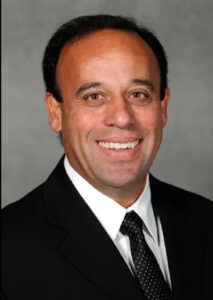By Manny Miranda
The pandemic dramatically increased America’s reliance on the energy grid. We are now working more comfortably from home, traveling more sustainably in electric vehicles and seeing more of the world through smarter devices thanks to readily available plug-in power.
It’s easy to take the infrastructure that brings us these wonders for granted. But as the demand for reliable electric service increases, significant challenges to providing it lie ahead.

The desire for more clean, renewable energy brings with it the need for building new transmission and distribution lines to deliver that power, which often must travel to population centers from remote solar and wind farms. As we navigate this expansion, let’s not overlook the limitations of the power grid we rely on today.
The American Society of Civil Engineers calls the existing grid “aging,” with 70 percent of U.S. power lines well into the second half of their life expectancy. The Wall Street Journal pronounced the grid “increasingly unreliable” in an article earlier this year.
These vulnerabilities were highlighted by California wildfires and brutally frigid temperatures in Texas in 2021 that produced devastating outages.
In a culture that expects continuous technological advances, statistics compiled by the U.S. Department of Energy suggest the nation’s electric distribution system has been stagnant. Even when hurricanes and other major events are removed from calculations, the average customer in the U.S. experienced slightly more outages and spent slightly more time without power in 2020 than in 2013.
But it doesn’t have to be that way.
Florida Power & Light Company customers have seen a 45 percent improvement in day-to-day reliability over the last decade. The average FPL customer in 2021 experienced the fewest outages, the fewest momentary interruptions or flickers and the shortest overall outage duration of any year in company history. This was no accident. It required significant investment, and a shared commitment from regulators, customers and our utility.
Our customers are not alone. There are other utilities across the nation that have significantly improved reliability in recent years by strengthening their grids and leveraging technology. It is especially important that utilities respond to the unique challenges of the regions they serve because there isn’t a one-size-fits-all solution to effective power delivery.
In Florida, after multiple hurricanes pounded our state in 2004 and 2005, utilities and the Florida Public Service Commission recognized the need to harden the grid. These hardening measures have included strengthening poles and transmission structures to withstand extreme wind loads; putting more power lines underground; increasing inspections of poles and equipment; more robust management of vegetation near power lines; and fortifying substations against flooding and storm surge.
While we made these investments to enhance resiliency in the face of hurricanes and extreme weather, they had the added benefit of improving our everyday reliability.
As the nation’s population and energy demands continue to grow, we cannot get complacent. We must continue to innovate to deliver even better service to our current and future customers.
As an example of innovation, FPL has installed more than 200,000 intelligent devices along the grid to detect issues before they become bigger problems, which will isolate and shorten outages in many cases. Our fleet of drones flew more than 120,000 missions in 2021 to assess Florida’s infrastructure and identify potential problems. For every investment, we must assess the customer value: the hours or days we can save by restoring power sooner after an event, allowing our customers’ businesses and the state’s economy to get back up and running faster.
Importantly, we’ve been able to make these investments while keeping customer bills below the national average for over a decade.
This year marks the 30th anniversary of devastating Hurricane Andrew. I worked in Miami-Dade County during that storm and witnessed its havoc firsthand. Floridians who have lived through hurricanes know the importance of upgrading essential electric facilities to increase their resiliency.
To meet our nation’s reliability challenges, we can’t afford to take the grid for granted any longer. Utilities must embrace strengthening and modernization to keep pace with our changing energy needs, with state and federal policies that support these efforts. I look forward to continuing to learn from my peers, just as I hope Florida continues to set an example that spurs others across the country to work together to meet the increasing demand for reliable electric service in the years ahead.
Manny Miranda, executive vice president of power delivery, Florida Power & Light. He wrote this piece for the Florida Times-Union in Jacksonville, which is part of the Invading Sea collaborative of Florida editorial boards focused on the threats posed by the warming climate.



